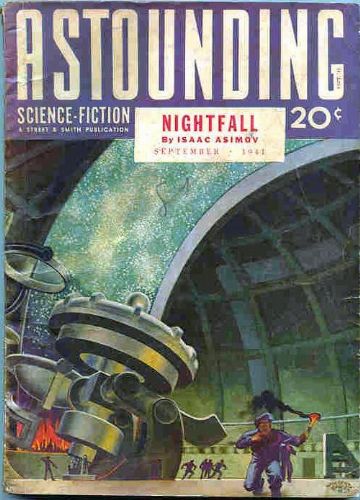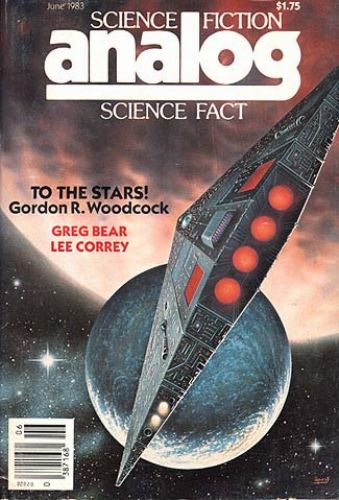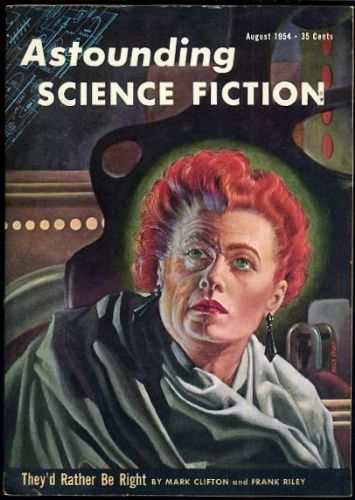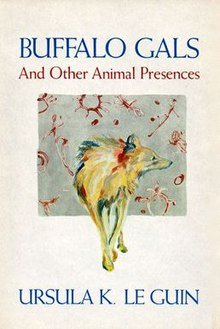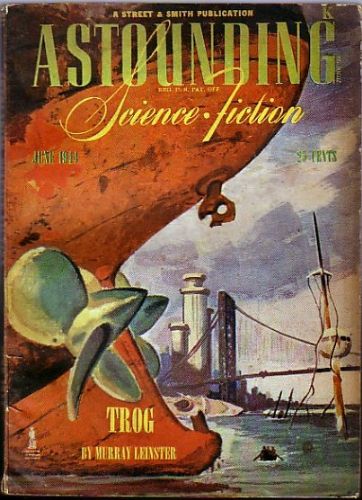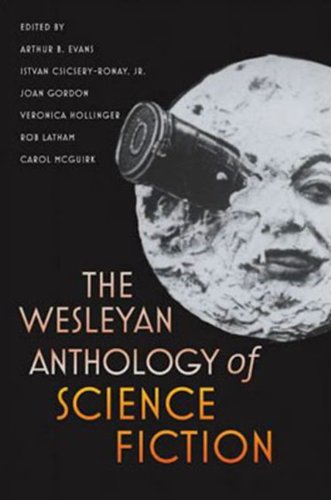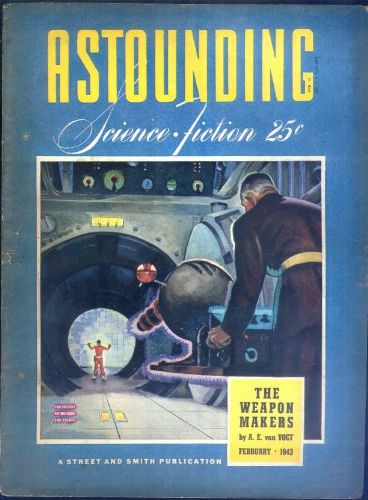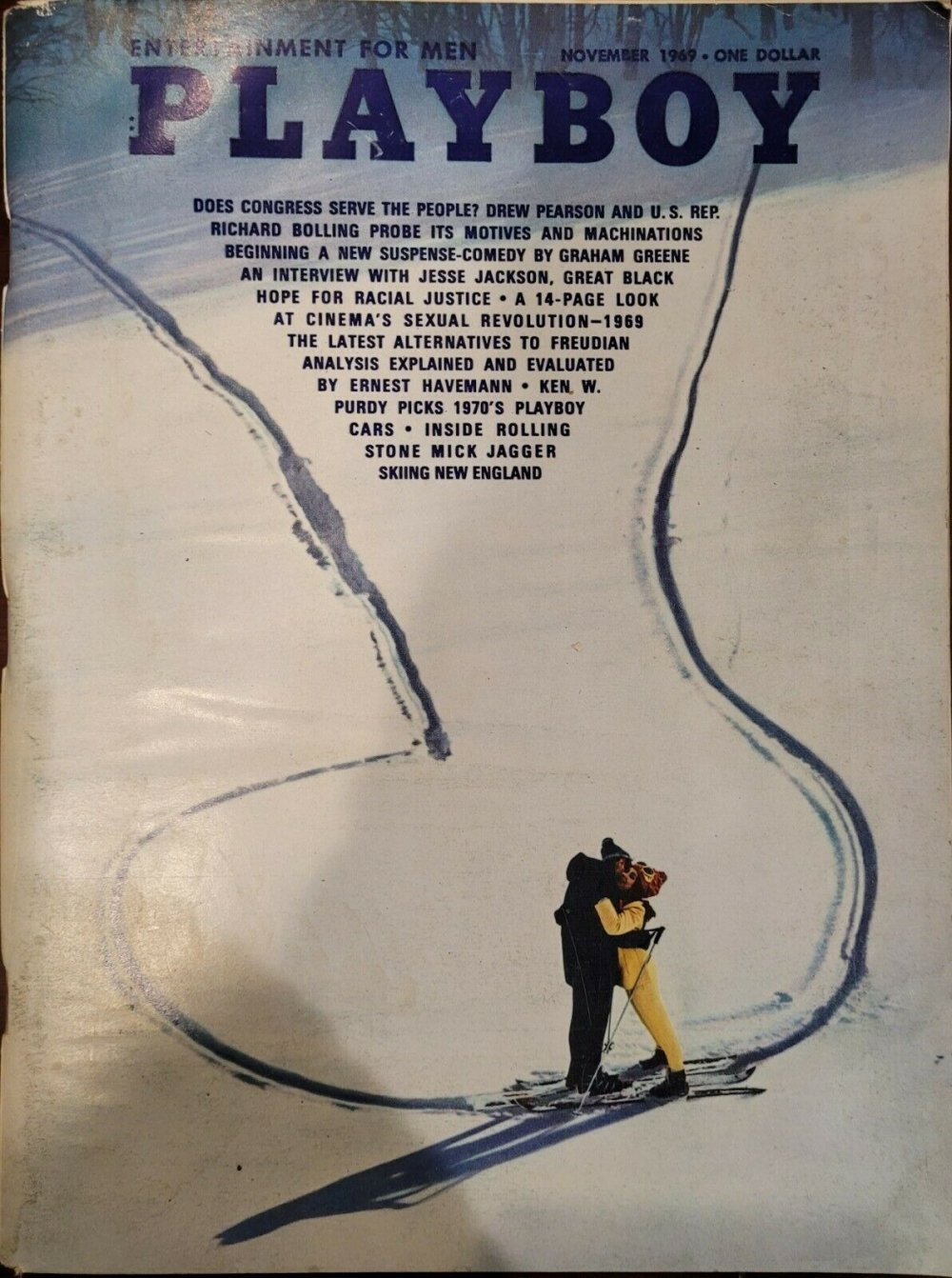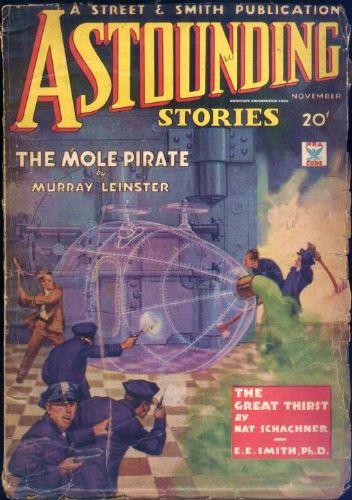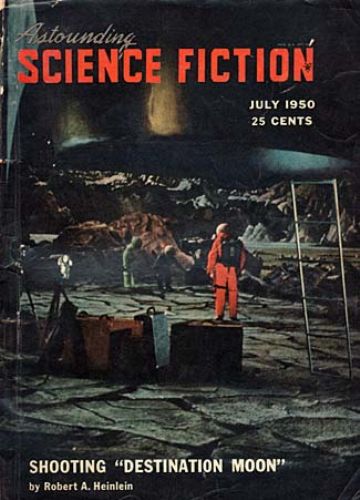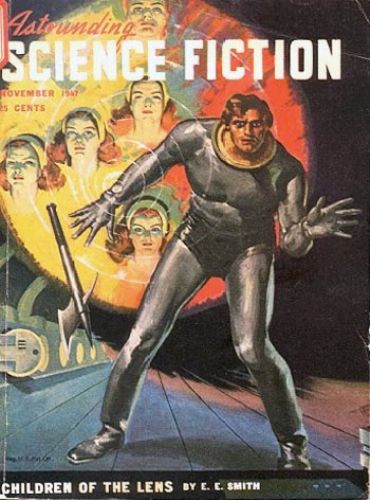Top SF/F/H Novelettes
science fiction awards database
Rankings: | |||||
| SF Novels | FH Novels | Novellas | Novelettes | Short stories | | Scoring Methodology |
Sources: | ||||
| Awards | Citations | Anthologies | ||
1. Nightfall , Isaac Asimov (1941)
The sentient culture on a planet in a star system of six suns has never experienced darkness. As an alignment of five of the planets and the predicted eclipse of the sixth portends such darkness, an astronomer deals with a skeptical journalist and with a member of a religious Cult, whose "Book of Revelations" predicts a period of madness, the fall of civilization, and the appearance of something called "stars."
• The story was published in Astounding in 1941, just 2 1/2 years after Asimov's first story publication. It has remained his most popular story in all the decades since. It was reprinted so frequently in anthologies of the 1950s and 1960s that Asimov hesitated to include it in one of his own collections until 1969, with Nightfall and Other Stories. The following year it ranked 1st in the poll that became The Science Fiction Hall of Fame. Robert Silverberg expanded the story into novel Nightfall in 1990.
• The story was famously inspired by a quote from Emerson (about how the rare revelation of stars would inspire faith in God), which editor John W. Campbell and the author disagreed with. Unlike most Asimov stories (but like Asimov's personal favorite "The Last Question"), it's not so much a puzzle or mystery story as it is a series of successive revelations, with themes including the tension between science and religion, the truth that might be buried in ancient religious texts, and the speculations of scientists about things outside their personal experience.
• The story was published in Astounding in 1941, just 2 1/2 years after Asimov's first story publication. It has remained his most popular story in all the decades since. It was reprinted so frequently in anthologies of the 1950s and 1960s that Asimov hesitated to include it in one of his own collections until 1969, with Nightfall and Other Stories. The following year it ranked 1st in the poll that became The Science Fiction Hall of Fame. Robert Silverberg expanded the story into novel Nightfall in 1990.
• The story was famously inspired by a quote from Emerson (about how the rare revelation of stars would inspire faith in God), which editor John W. Campbell and the author disagreed with. Unlike most Asimov stories (but like Asimov's personal favorite "The Last Question"), it's not so much a puzzle or mystery story as it is a series of successive revelations, with themes including the tension between science and religion, the truth that might be buried in ancient religious texts, and the speculations of scientists about things outside their personal experience.
Score: 49.51
Awards: none
Compiled anthologies: 16 (listed here); Other anthologies and collections: 28
Citations: 2012LocusOnlinePoll 1971AnalogPoll 1999LocusOnlinePoll
2. Blood Music , Greg Bear (1983)
A biotechnologist invents a type of Medically Applicable Biochip with heuristic programming, and injects a colony of them into himself. He finds his body being rebuilt from the inside, the MABs having become nucleoprotein computers, building cultures, like little cities. And he worries what will happen when they discover him, that the MABs are living inside a body with its own consciousness.
• In this early story about nanotechnology and its post-human implications, the appearance of a miniature civilization recalls other enduring stories, including Theodore Sturgeon's "Microcosmic God," James Blish's "Surface Tension," and George R.R. Martin's "Sandkings."
• This story appeared some 18 years into Bear's career, following the well-received short story "Petra" and novella "Hardfought," and was expanded into a novel in 1985. The definitive volume of Bear's short fiction is The Collected Stories of Greg Bear (2002).
• In this early story about nanotechnology and its post-human implications, the appearance of a miniature civilization recalls other enduring stories, including Theodore Sturgeon's "Microcosmic God," James Blish's "Surface Tension," and George R.R. Martin's "Sandkings."
• This story appeared some 18 years into Bear's career, following the well-received short story "Petra" and novella "Hardfought," and was expanded into a novel in 1985. The definitive volume of Bear's short fiction is The Collected Stories of Greg Bear (2002).
Score: 48.73
Awards: Hugo Locus Nebula Sfc Wfa
Compiled anthologies: 14 (listed here); Other anthologies and collections: 4
Citations: 2012LocusOnlinePoll 1999LocusOnlinePoll
3. A Martian Odyssey, Stanley G. Weinbaum (1934)
The first expedition to Mars -- a Mars imagined in the 1930s with breathable air and ancient, dry canals -- discovers a series of bizarre aliens: grass that moves; an ostrich-like, intelligent alien dubbed Tweel; an ancient pyramid-building creature that ejects bubble-like spores into the air; a tentacled dream-beast that projects illusions of what its prey wants to see; and a mound-building culture of barrel-like creatures that worships a crystal that vanquishes pain.
• More than any other story on this list, this is best appreciated in its historical context. It was Weinbaum's first story, and in 1934 it depicted alien creatures not as monsters to be subdued as in earlier pulp science fiction, but as creatures with their own kinds of intelligence. (Yet it also, in the final scenes, illustrates mankind's presumption to interfere with alien cultures.) With this story's publication, Weinbaum became the post popular science fiction writer of his day.
• Weinbaum published only a baker's dozen stories until his early death in 1935. The Best of Stanley G. Weinbaum, with nine stories, was published in 1974; other selections are currently available as ebooks.
• More than any other story on this list, this is best appreciated in its historical context. It was Weinbaum's first story, and in 1934 it depicted alien creatures not as monsters to be subdued as in earlier pulp science fiction, but as creatures with their own kinds of intelligence. (Yet it also, in the final scenes, illustrates mankind's presumption to interfere with alien cultures.) With this story's publication, Weinbaum became the post popular science fiction writer of his day.
• Weinbaum published only a baker's dozen stories until his early death in 1935. The Best of Stanley G. Weinbaum, with nine stories, was published in 1974; other selections are currently available as ebooks.
Score: 47.03
Awards: none
Compiled anthologies: 14 (listed here); Other anthologies and collections: 9
Citations: 2012LocusOnlinePoll 1971AnalogPoll 1971AnalogPollPre1940 1999LocusOnlinePoll
4. Bloodchild , Octavia E. Butler (1984)
On an alien planet the intelligent, wormlike Tlic have become dependent on a wayward colony of human settlers for their reproductive cycle, as a young human boy coming of age faces his obligation to host the grubs of his Tlic caretaker inside his own body.
• This won all the major awards; its grotesque premise is mollified, as in "Speech Sounds," by Butler's sensitive characterizations and delicate dramatic conclusion.
• Best known as a novelist, Octavia Butler published only a dozen or so stories, but three of them have gained high status: this one, "Speech Sounds" from 1983, and "The Evening, the Morning, and the Night" (1987). Like few other authors, Butler's reputation has grown since her untimely death at age 59. Bloodchild and Other Stories was published in 2005; this 2021 Library of America volume includes two novels and her collected stories.
• This won all the major awards; its grotesque premise is mollified, as in "Speech Sounds," by Butler's sensitive characterizations and delicate dramatic conclusion.
• Best known as a novelist, Octavia Butler published only a dozen or so stories, but three of them have gained high status: this one, "Speech Sounds" from 1983, and "The Evening, the Morning, and the Night" (1987). Like few other authors, Butler's reputation has grown since her untimely death at age 59. Bloodchild and Other Stories was published in 2005; this 2021 Library of America volume includes two novels and her collected stories.
Score: 46.86
Awards: Hugo Locus Nebula Sfc Wfa
Compiled anthologies: 16 (listed here); Other anthologies and collections: 1
Citations: 2012LocusOnlinePoll 1999LocusOnlinePoll
5. The Cold Equations , Tom Godwin (1954)
The pilot of an emergency spaceship taking a cure to a planet wracked by a fever discovers he has a stowaway: the teenaged sister of one of the men on the planet. The pilot has to explain to her how the extra weight of her presence, on a ship carefully planned with fuel only to reach and land on the planet, jeopardizes the mission.
• This is one of the most famous, and controversial, hard science fiction stories of all time, in its insistence that the "cold equations" of physics, the physical reality of the universe itself, overrule human values and compassion. And by choosing the tragic ending, rather than contriving a happy one, it is like "Flowers for Algernon"; and that's why these stories are remembered, and discussed (e.g. here), to this day.
• Tom Godwin was not a prolific or influential author, aside from this story. He published three or four novels, and a dozen or so stories, but nothing that had the impact of this one story.
• This is one of the most famous, and controversial, hard science fiction stories of all time, in its insistence that the "cold equations" of physics, the physical reality of the universe itself, overrule human values and compassion. And by choosing the tragic ending, rather than contriving a happy one, it is like "Flowers for Algernon"; and that's why these stories are remembered, and discussed (e.g. here), to this day.
• Tom Godwin was not a prolific or influential author, aside from this story. He published three or four novels, and a dozen or so stories, but nothing that had the impact of this one story.
Score: 45.19
Awards: Hugo
Compiled anthologies: 13 (listed here); Other anthologies and collections: 16
Citations: 2012LocusOnlinePoll 1971AnalogPoll 1999LocusOnlinePoll
6. Buffalo Gals, Won't You Come Out Tonight, Ursula K. Le Guin (1987)
A girl, Maya, falls from a plane into the southwestern US desert, where she meets Coyote, who is at once a coyote and a woman. Coyote introduces Maya to a whole village of short people whose identities are simultaneously various animals -- they are the "First People," she's told. Maya struggles to understand this world while yearning to return to her own.
• The story was first published in the Le Guin small press collection Buffalo Gals and Other Animal Presences (Sept. 1987) but also appeared in the Nov. 1987 issue of The Magazine of Fantasy and Science Fiction. It won the Hugo and World Fantasy awards, placed second for a Theodore Sturgeon award, placed third for a Locus Award, and was a Nebula finalist. (Its rival in all races was Pat Murphy's "Rachel in Love," which won the Nebula, Sturgeon, and Locus awards, and is listed below.)
• Le Guin worked fluidly in both science fiction and fantasy. A recent compilation of her short work is The Unreal and the Real: The Selected Short Stories of Ursula K. Le Guin (2017). Her many novels include The Left Hand of Darkness (1969), the Earthsea trilogy (beginning 1968 with A Wizard of Earthsea), and The Dispossessed (1974).
• The story was first published in the Le Guin small press collection Buffalo Gals and Other Animal Presences (Sept. 1987) but also appeared in the Nov. 1987 issue of The Magazine of Fantasy and Science Fiction. It won the Hugo and World Fantasy awards, placed second for a Theodore Sturgeon award, placed third for a Locus Award, and was a Nebula finalist. (Its rival in all races was Pat Murphy's "Rachel in Love," which won the Nebula, Sturgeon, and Locus awards, and is listed below.)
• Le Guin worked fluidly in both science fiction and fantasy. A recent compilation of her short work is The Unreal and the Real: The Selected Short Stories of Ursula K. Le Guin (2017). Her many novels include The Left Hand of Darkness (1969), the Earthsea trilogy (beginning 1968 with A Wizard of Earthsea), and The Dispossessed (1974).
Score: 42.51
Awards: Hugo Locus Nebula Sfc Sturgeon Wfa
Compiled anthologies: 10 (listed here); Other anthologies and collections: 4
Citations: 2012LocusOnlinePoll 1999LocusOnlinePoll
7. Sandkings , George R. R. Martin (1979)
Simon Kress, a wealthy man on the colony world Baldur who is fond of grotesque or dangerous "pets," acquires four sets of "sandkings," insect-like creatures with six legs and eyes. They have telepathic hive-minds, build "castles," and will worship him, his dealer assures. Kress installs them into his home, encourages them to fight wars, invites guests over to see them, and sees them construct images of his face. And then things start to go wrong.
• From 1979, this is one of Martin's longer stories in the first decade of his career, and is a perfect example of the blending of science fiction and horror. It's another miniature world story, like Bear's "Blood Music" and Sturgeon's "Microcosmic God." Unlike those stories, in this one the creatures here are truly creepy.
• Martin is of course best known for his "Song of Ice and Fire" series, beginning with A Game of Thrones in 1996, but he began his career writing mostly science fiction, including novel Dying of the Light (1977). His best short work is collected in Dreamsongs (2007), in two volumes.
• From 1979, this is one of Martin's longer stories in the first decade of his career, and is a perfect example of the blending of science fiction and horror. It's another miniature world story, like Bear's "Blood Music" and Sturgeon's "Microcosmic God." Unlike those stories, in this one the creatures here are truly creepy.
• Martin is of course best known for his "Song of Ice and Fire" series, beginning with A Game of Thrones in 1996, but he began his career writing mostly science fiction, including novel Dying of the Light (1977). His best short work is collected in Dreamsongs (2007), in two volumes.
Score: 40.14
Awards: Hugo Locus Nebula Wfa | Balrog
Compiled anthologies: 13 (listed here); Other anthologies and collections: 8
Citations: 2012LocusOnlinePoll 1999LocusOnlinePoll
8. Flowers for Algernon , Daniel Keyes (1959)
Charlie Gordon, a 37-year-old janitor with an IQ of 68, is recruited for an experimental treatment to triple his IQ. Charlie's first-person account of his treatment begins with many misspellings and misunderstandings, e.g. about "raw shok" tests. He learns about a mouse, Algernon, who's undergone a similar treatment, and how it turned out to be only temporary. Charlie's treatment is dramatically successful to the point where he collaborates with his own doctors. But then the effect begins to slip, and the inevitable follows.
• Keyes expanded the story into a 1966 novel, which won a Nebula Award, and which was adapted into the 1968 film Charly, starring Cliff Robertson, who won an Oscar for the role. Rather like Tom Godwin, Keyes has remained famous for this one work, while having otherwise produced only a handful of other novels and short works. In 2000 Keyes published an entire book about the writing of this story and the aftermath of its publication: Algernon, Charlie and I: A Writer's Journey.
• The novel's exploration of Charlie's sexual desires caused challenges for the book's removal from libraries, Wikipedia notes. And like "The Cold Equations," the story was challenged by an editor (Horace Gold at Galaxy) for a happy ending, which Keyes refused to supply. SFE notes the story's theme as an "uplift" event, i.e. an artificially imposed increase in intelligence, an idea later made prominent by 2001, David Brin, and others.
• Keyes expanded the story into a 1966 novel, which won a Nebula Award, and which was adapted into the 1968 film Charly, starring Cliff Robertson, who won an Oscar for the role. Rather like Tom Godwin, Keyes has remained famous for this one work, while having otherwise produced only a handful of other novels and short works. In 2000 Keyes published an entire book about the writing of this story and the aftermath of its publication: Algernon, Charlie and I: A Writer's Journey.
• The novel's exploration of Charlie's sexual desires caused challenges for the book's removal from libraries, Wikipedia notes. And like "The Cold Equations," the story was challenged by an editor (Horace Gold at Galaxy) for a happy ending, which Keyes refused to supply. SFE notes the story's theme as an "uplift" event, i.e. an artificially imposed increase in intelligence, an idea later made prominent by 2001, David Brin, and others.
Score: 38.04
Awards: Hugo
Compiled anthologies: 13 (listed here); Other anthologies and collections: 15
Citations: 2012LocusOnlinePoll 1971AnalogPoll 1999LocusOnlinePoll
9. 'Arena', Fredric Brown (1944)
In the midst of an interstellar war between humans and unseen alien Outsiders, Carson, human pilot of a one-man scouter, abruptly finds himself naked under a dome in a landscape with rocks and blue sand. A counterpart Outsider is in the same dome, with an invisible barrier between them. A voice in his head, claiming to be of a superior, ancient species, explains that each of them represent their races, to battle, and only one of them can survive. Discovering that inanimate objects can pass through the barrier, the opponents build weapons to attack the other, until Carson has a crucial insight.
• This is a story, like Bixby's "It's a Good Life," that perhaps has an outsized reputation because of, in this case, its (inadvertant) adaptation into a Star Trek episode broadcast in 1967 and written by Trek producer Gene L. Coon, that was belatedly credited to Brown. The setup of the original story, especially the tone of the unseen alien, is almost exactly the tone of Trek. The details are different between the two, of course. Yet the main difference is that in the original story, the victor survives with his race and the opponents are destroyed; in the Trek episode Kirk spares the Gorn. And in James Blish’s adaptation of this episode, the Metron admits he would have destroyed the winning race, as more of a threat to his own species.
• Brown was a prolific author in the 1940s and '50s, often for humorous stories; novels included What Mad Universe (1949) and Martians, Go Home (1955), and popular stories like "Answer," "Placet Is a Crazy Place," and "Puppet Show." A volume of his complete short stories, From These Ashes, was published by NESFA Press in 2001.
• This is a story, like Bixby's "It's a Good Life," that perhaps has an outsized reputation because of, in this case, its (inadvertant) adaptation into a Star Trek episode broadcast in 1967 and written by Trek producer Gene L. Coon, that was belatedly credited to Brown. The setup of the original story, especially the tone of the unseen alien, is almost exactly the tone of Trek. The details are different between the two, of course. Yet the main difference is that in the original story, the victor survives with his race and the opponents are destroyed; in the Trek episode Kirk spares the Gorn. And in James Blish’s adaptation of this episode, the Metron admits he would have destroyed the winning race, as more of a threat to his own species.
• Brown was a prolific author in the 1940s and '50s, often for humorous stories; novels included What Mad Universe (1949) and Martians, Go Home (1955), and popular stories like "Answer," "Placet Is a Crazy Place," and "Puppet Show." A volume of his complete short stories, From These Ashes, was published by NESFA Press in 2001.
Score: 37.63
Awards: none
Compiled anthologies: 12 (listed here); Other anthologies and collections: 14
Citations: 2012LocusOnlinePoll 1971AnalogPoll 1999LocusOnlinePoll
10. Burning Chrome , William Gibson (1982)
In a future in which society is bound together through the "matrix" (Gibson's anticipation, in the early 1980s, of the internet) two hackers, "cowboy" Bobby Quine and his partner Automatic Jack, plan an elaborate sting against brothel owner Chrome, using ICE, Intrusion Countermeasures Electronics. Bobby's latest girlfriend, Rikki, who is obsessed with acquiring artificial eyes and becoming a streaming star like her idol Tally Isham, plays a key role in the operation that neither man realizes until the sting is over.
• This is one of a handful of short works Gibson wrote in the early 1980s in the same cyberpunk universe as his debut novel Neuromancer: "Johnny Mnemonic," "New Rose Hotel," and "The Winter Market." Like this story and the novel they are dense, imaginative, visionary, multicultural.
• This is the story that introduced the world to the term cyberspace, and includes Gibson's iconic observation that "The street finds its own uses for things." Gibson's one story collection is Burning Chrome, first published in 1986.
• This is one of a handful of short works Gibson wrote in the early 1980s in the same cyberpunk universe as his debut novel Neuromancer: "Johnny Mnemonic," "New Rose Hotel," and "The Winter Market." Like this story and the novel they are dense, imaginative, visionary, multicultural.
• This is the story that introduced the world to the term cyberspace, and includes Gibson's iconic observation that "The street finds its own uses for things." Gibson's one story collection is Burning Chrome, first published in 1986.
Score: 35.9
Awards: Hugo Locus Nebula Sfc Wfa
Compiled anthologies: 10 (listed here); Other anthologies and collections: 1
Citations: 2012LocusOnlinePoll 1999LocusOnlinePoll
11. Mimsy Were the Borogoves, Henry Kuttner (1943)
Millions of years in the future, scientist Unthahorsten experiments with sending a box of discarded children's toys back into time. In 1942, seven-year-old Scott Paradine finds the box along a creek, and takes it home to share with his two-year-old sister Emma. They discover many odd items in the box, such as a crystal block with tiny people inside, whose activities Scott can direct with his mind. Their parents become concerned as the children seem to exhibit talents outside normal childhood development, perhaps, a psychologist suggests) because unlike adults they have not been conditioned by ideas like Euclidean logic. And the childrens' talents mature.
• The title, of course, is a line from Lewis Carroll's "Jabberwocky" in Through the Looking Glass. The story was first published as by Lewis Padgett, a frequent pseudonym (among others) of husband and wife writing team Henry Kuttner and C.L. Moore. They used different pseudonyms for different kinds of stories; other Padgett stories include "The Piper's Son" (1945), "Private Eye" (1949), and similar to this story "The Twonky" (1942), while their most famous story, "Vintage Season" (1946), was published under the pseudonym Lawrence O'Donnell. As it turns out, the title isn't merely metaphorical; the story reveals that the future scientist sent another such box to a man Charles, and the girl Alice.
• The story's strong underlying theme is that of child psychology (a significant character is a child psychologist), suggesting that childrens' minds are open to ideas that human adults have been enculturated to ignore or rebel against. And at the same time implies that other types of minds might perceive a broader universe than ordinary human adults do.
• The title, of course, is a line from Lewis Carroll's "Jabberwocky" in Through the Looking Glass. The story was first published as by Lewis Padgett, a frequent pseudonym (among others) of husband and wife writing team Henry Kuttner and C.L. Moore. They used different pseudonyms for different kinds of stories; other Padgett stories include "The Piper's Son" (1945), "Private Eye" (1949), and similar to this story "The Twonky" (1942), while their most famous story, "Vintage Season" (1946), was published under the pseudonym Lawrence O'Donnell. As it turns out, the title isn't merely metaphorical; the story reveals that the future scientist sent another such box to a man Charles, and the girl Alice.
• The story's strong underlying theme is that of child psychology (a significant character is a child psychologist), suggesting that childrens' minds are open to ideas that human adults have been enculturated to ignore or rebel against. And at the same time implies that other types of minds might perceive a broader universe than ordinary human adults do.
Score: 33.94
Awards: RetroHugo
Compiled anthologies: 7 (listed here); Other anthologies and collections: 12
Citations: 2012LocusOnlinePoll 1971AnalogPoll 1999LocusOnlinePoll
12. Rachel in Love , Pat Murphy (1987)
Rachel is enhanced chimpanzee who lives out in the desert with her "father," a Dr. Aaron Jacobs, who has endowed her with the Electric Mind recording of his late daughter, who died in a car crash. So Rachel has memories and personalities of both human and chimp, and has learned sign language, ASL, to communicate. When her "father" dies, she escapes his house and is then caught and taken to a primate research center, where she is caged and treated tortuously. She befriends a slow-witted, deaf janitor, and plots her escape.
• Murphy's novel The Falling Woman won a Nebula Award the same year this story won the Nebula, Sturgeon, and Locus awards; the story was also nominated for a Hugo. Her collection Points of Departure won a Philip K. Dick Award (for best original paperback), and her story "Bones" won a World Fantasy Award.
• This is the second story on this list, after the Keyes, concerning a slow-witted janitor.
• Murphy's novel The Falling Woman won a Nebula Award the same year this story won the Nebula, Sturgeon, and Locus awards; the story was also nominated for a Hugo. Her collection Points of Departure won a Philip K. Dick Award (for best original paperback), and her story "Bones" won a World Fantasy Award.
• This is the second story on this list, after the Keyes, concerning a slow-witted janitor.
Score: 33.94
Awards: Hugo Locus Nebula Sfc Sturgeon Wfa | AsimovReader
Compiled anthologies: 10 (listed here); Other anthologies and collections: 4
Citations: 2012LocusOnlinePoll 1999LocusOnlinePoll
13. Fire Watch , Connie Willis (1982)
Bartholomew, an unprepared time traveler from 21st century Oxford, is sent to 1940 London to observe how St. Paul's Cathedral survived the bombing of German incendiaries during the Blitz. His implanted memory retrieval system isn't working and so he has to wing it, lest he give himself away. He suspects a contemporary of being a Communist, who in turn suspects him, since he's unfamiliar with cats. He returns to his 21st century on schedule, reflecting on the past in which like Hiroshima, and Denver, St. Paul's was nuked by the communists.
• This was Connie Willis' earliest story about World War II London and English history -- united by their starting points from a time-traveling Oxford under the instruction of a Mr. Dunworthy -- later explored in novels Doomsday Book (1992), To Say Nothing of the Dog (1998), and the pair Blackout and All Clear (2010).
• As in many of these top-ranked stories, this ends on a very indirect, almost ambiguous note, of self-reflection, of newly found wisdom. The story is composed of much busy-body plotting that is familiar from the author's novels: lots of short scenes, recurring themes brought up in each one. And the surprise ending here is that this history isn't our history, not even the history from 1982, when this story was published.
• This was Connie Willis' earliest story about World War II London and English history -- united by their starting points from a time-traveling Oxford under the instruction of a Mr. Dunworthy -- later explored in novels Doomsday Book (1992), To Say Nothing of the Dog (1998), and the pair Blackout and All Clear (2010).
• As in many of these top-ranked stories, this ends on a very indirect, almost ambiguous note, of self-reflection, of newly found wisdom. The story is composed of much busy-body plotting that is familiar from the author's novels: lots of short scenes, recurring themes brought up in each one. And the surprise ending here is that this history isn't our history, not even the history from 1982, when this story was published.
Score: 33.15
Awards: Hugo Locus Nebula Sfc Wfa | Balrog
Compiled anthologies: 9 (listed here); Other anthologies and collections: 8
Citations: 2012LocusOnlinePoll 1999LocusOnlinePoll
14. Nine Lives , Ursula K. Le Guin (1969)
A crew of explorers on a planet with uranium resources worth mining is a tenclone, consisting of 5 females and 5 males, all named John Chow but with different middle names. When an earthquake kills all but one of the ten, the survivor suffers the throes of loss he barely comprehends: he's alone for the first time in his life.
• This was published in the famous men's magazine Playboy in 1969, notoriously using the pseudonym U.K. Le Guin so as not to put off male readers with the idea of a female author.
• This is a story about clones that doesn't presume any kind of psychic or telepathic connection among them, as other stories about clones have done; rather the shock of the lone survivor comes from the breaking of his life-long psychological bonding. A larger issue is about diversity: the reason a group of identical clones might not work in a given situation is the same reason you don’t want an entire population of similar thinking people.
• This was published in the famous men's magazine Playboy in 1969, notoriously using the pseudonym U.K. Le Guin so as not to put off male readers with the idea of a female author.
• This is a story about clones that doesn't presume any kind of psychic or telepathic connection among them, as other stories about clones have done; rather the shock of the lone survivor comes from the breaking of his life-long psychological bonding. A larger issue is about diversity: the reason a group of identical clones might not work in a given situation is the same reason you don’t want an entire population of similar thinking people.
Score: 32.42
Awards: Hugo Nebula
Compiled anthologies: 16 (listed here); Other anthologies and collections: 12
Citations: 2012LocusOnlinePoll 1999LocusOnlinePoll
15. Twilight, John W. Campbell (1934)
A man picks up a hitchhiker, out in the middle of nowhere, who claims to be a time traveler who has visited the far future of 7 million years. He describes a deserted city where the machines still work, then the city of "San Frisco" populated by people with big heads and big eyes. They are long-lived, and have destroyed all other life on Earth, populated the solar system before withdrawing; they are intelligent but have lost curiosity and operate their machines without understanding them.
• This bleak story was published under the pseudonym Don A. Stuart, the name Campbell used for several early stories (including "Who Goes There?"), that reflect a quite different philosophy about the future than Campbell expressed as editor of Astounding/Analog beginning in 1937.
• As editor, especially through the 1950s, Campbell enforced among his authors a positive view of humanity's ascent into and conquest of space, in particular that alien races would never defeat humans.
• This bleak story was published under the pseudonym Don A. Stuart, the name Campbell used for several early stories (including "Who Goes There?"), that reflect a quite different philosophy about the future than Campbell expressed as editor of Astounding/Analog beginning in 1937.
• As editor, especially through the 1950s, Campbell enforced among his authors a positive view of humanity's ascent into and conquest of space, in particular that alien races would never defeat humans.
Score: 32.28
Awards: none
Compiled anthologies: 11 (listed here); Other anthologies and collections: 5
Citations: 2012LocusOnlinePoll 1971AnalogPoll 1971AnalogPollPre1940 1999LocusOnlinePoll
16. Surface Tension, James Blish (1952)
Humans seed alien worlds by altering their biology to suit local environments. On the water world of a planet circling Tau Ceti, the result is a race of miniature creatures living in a pond, with no understanding of their origins except for metal plates containing the "wisdom of the creators." As a couple scholars deduce the implications of those plates, an expedition sets off in a tiny "spaceship" to travel to the stars -- that is, across a patch of dry land to the next pond -- that requires penetrating the surface tension of the water world they live in, to come out into "space," underneath a sky.
• This is a story on the key science fictional theme of how human perception is limited by environment, and how perception of a larger environment leads to a conceptual breakthough about the nature of reality.
• Blish wrote a cycle of stories about the idea of Pantropy, adjusting human biology to alien planets. When Blish published this story in his 1957 book The Seedling Stars, he merged it with earlier 1942 story "Sunken History." Most reprints of "Surface Tension" use the 1952 version, but a signifant exception is the VanderMeer's Big Book of Science Fiction, which reprints the longer combined version from 1957.
• This is a story on the key science fictional theme of how human perception is limited by environment, and how perception of a larger environment leads to a conceptual breakthough about the nature of reality.
• Blish wrote a cycle of stories about the idea of Pantropy, adjusting human biology to alien planets. When Blish published this story in his 1957 book The Seedling Stars, he merged it with earlier 1942 story "Sunken History." Most reprints of "Surface Tension" use the 1952 version, but a signifant exception is the VanderMeer's Big Book of Science Fiction, which reprints the longer combined version from 1957.
Score: 32.02
Awards: Hugo
Compiled anthologies: 8 (listed here); Other anthologies and collections: 11
Citations: 2012LocusOnlinePoll 1971AnalogPoll 1999LocusOnlinePoll
17. The Little Black Bag , C. M. Kornbluth (1950)
This is another story (like "Mimsy Were the Borogoves") about an offhand piece of fantastic technology from the future sent back to our present. In this case the recipient is a drunk, discredited doctor, and the technology is a futuristic doctor's black bag. He quickly learns how to use it, with all its futuristic instruments, to service locals in his ghetto. The sister of a girl he saves goes into business with him, and they become wealthy. He is anxious to pass on the bag for the benefit of humanity; she is hungry for money. Their tension is resolved when the future sender of the bag deactivates it.
• The theme here anticipates Kornbluth's later "The Marching Morons" (1951) in which dumb people are thought to reproduce more often than smart people and so threaten the viability of the human race. Another idea is that futuristic instruments are built with “ultra-simple” operating systems, so that even morons can use them. Is there a mapping here to, say, iPhones? Certainly to the idea that nowadays people use technology without any clue about understanding it.
• C. M. Kornbluth was a noted author in the early 1950s, who died young, in 1958 at age 35. He was best known for stories like this one and "The Marching Morons," and also for collaborations with Frederik Pohl, especially The Space Merchants (1953), a satire about 1950s advertising, and Gladiator-at-Law (1955), a satire about lawyers. His solo novels include The Syndic (1953) and Not This August (1955). The definitive collection is His Share of Glory: The Complete Short Science Fiction of C. M. Kornbluth.
• The theme here anticipates Kornbluth's later "The Marching Morons" (1951) in which dumb people are thought to reproduce more often than smart people and so threaten the viability of the human race. Another idea is that futuristic instruments are built with “ultra-simple” operating systems, so that even morons can use them. Is there a mapping here to, say, iPhones? Certainly to the idea that nowadays people use technology without any clue about understanding it.
• C. M. Kornbluth was a noted author in the early 1950s, who died young, in 1958 at age 35. He was best known for stories like this one and "The Marching Morons," and also for collaborations with Frederik Pohl, especially The Space Merchants (1953), a satire about 1950s advertising, and Gladiator-at-Law (1955), a satire about lawyers. His solo novels include The Syndic (1953) and Not This August (1955). The definitive collection is His Share of Glory: The Complete Short Science Fiction of C. M. Kornbluth.
Score: 31.78
Awards: RetroHugo
Compiled anthologies: 10 (listed here); Other anthologies and collections: 11
Citations: 2012LocusOnlinePoll 1971AnalogPoll 1999LocusOnlinePoll
18. Thunder and Roses , Theodore Sturgeon (1947)
In the aftermath of a nuclear war, the US has been attacked by atomic bombs from the east and the west. Radiation will kill almost everyone in the western hemisphere, and the US has more bombs than the other side -- but has decided not to use them, to keep some remnant of the species, if not the west, alive. Now, on a military base where a popular singer, Starr Anthim, performs an inspiring song, two men discover that one of the master firing keys to launch those bombs, the one thought missing, is right here on their base.
• Published in 1947, as the Cold War was just setting in, the story reflects the tension and uncertainty of that era as seen in many other SF works of the late 1940s and 1950s.
• Except in its ultimate compassion, the story is unusual in Sturgeon's work, which often focuses on deeply personal situations, as in the novel More Than Human (1953) and stories like "Slow Sculpture" (1970) and "The Man Who Lost the Sea" (1959). A retrospective of his best stories is Selected Stories.
• Published in 1947, as the Cold War was just setting in, the story reflects the tension and uncertainty of that era as seen in many other SF works of the late 1940s and 1950s.
• Except in its ultimate compassion, the story is unusual in Sturgeon's work, which often focuses on deeply personal situations, as in the novel More Than Human (1953) and stories like "Slow Sculpture" (1970) and "The Man Who Lost the Sea" (1959). A retrospective of his best stories is Selected Stories.
Score: 31.64
Awards: none
Compiled anthologies: 10 (listed here); Other anthologies and collections: 14
Citations: 2012LocusOnlinePoll 1971AnalogPoll 1999LocusOnlinePoll
19. The Ugly Chickens , Howard Waldrop (1980)
A grad student in ornithology at the University of Texas at Austin encounters a woman who recognizes, from personal experience, a photo of dodo -- a bird species thought to have been extinct since the 17th or 18th century. Frantically, the grad student interviews the woman and follows her clues deep into the history of the American South, finding traces of what happened to those "ugly chickens," how they were brought to Europe and India and to a wealthy family in Memphis (and their grand feast), before he finally settles on their fate.
• Waldrop is known especially for short fiction, often in southern settings and on alternate history, counterfactual themes. Other prominent works include "Custer's Last Jump" (1976, with Steven Utley), "Do Ya, Do Ya, Wanna Dance?" (1988), and "“Flying Saucer Rock & Roll" (1985), along with one solo novel, Them Bones (1984).
• This story, exhaustively detailed, is not overtly fantastic, but the evidence it reveals amounts to a kind of alternate history. And it relates to science fiction in the way it suggests how the natural world is largely unseen, how little humans are aware of it; and so represents a milestone in the progression of the Anthropocene, Earth's sixth extinction, brought about by humanity. A selection of Waldrop's best work, including this story, is Things Will Never Be the Same: A Howard Waldrop Reader: Selected Short Fiction 1980-2005.
• Waldrop is known especially for short fiction, often in southern settings and on alternate history, counterfactual themes. Other prominent works include "Custer's Last Jump" (1976, with Steven Utley), "Do Ya, Do Ya, Wanna Dance?" (1988), and "“Flying Saucer Rock & Roll" (1985), along with one solo novel, Them Bones (1984).
• This story, exhaustively detailed, is not overtly fantastic, but the evidence it reveals amounts to a kind of alternate history. And it relates to science fiction in the way it suggests how the natural world is largely unseen, how little humans are aware of it; and so represents a milestone in the progression of the Anthropocene, Earth's sixth extinction, brought about by humanity. A selection of Waldrop's best work, including this story, is Things Will Never Be the Same: A Howard Waldrop Reader: Selected Short Fiction 1980-2005.
Score: 31.54
Awards: Hugo Locus Nebula Wfa | Balrog
Compiled anthologies: 10 (listed here); Other anthologies and collections: 3
Citations: 2012LocusOnlinePoll 1999LocusOnlinePoll
20. The Bicentennial Man , Isaac Asimov (1976)
A household robot, "Andrew," serving wealthy Gerald Martin and his family, exhibits a talent for wood carvings and is found by a robopsychologist to have been created with a creative fluke that can't be reproduced. As years pass Andrew seeks legal freedom, wears clothes like a person, works for robot rights, tranfers to an human-like android body, and becomes human to the point of accepting mortality at the age of 200.
• This was the culminating story in Asimov's decades-long series about positronic robots, beginning with "Robbie" in 1940, and the collection I, Robot in 1950. Published in 1976, the year of the American bicentennial, in this story Asimov cleverly contrives a plot for Andrew to survive a full 200 years and become the "bicentennial man" of the title.
• The story exhibits Asimov's talent for lawyerly arguments, yet demonstrates that Asimov could write an emotional, heart-wrenching story (about Andrew's mortality and his connection to "Little Miss") when he wanted to. (An earlier example was his "The Ugly Little Boy" from 1958.) The comprehensive collection of his robot stories, include this one, is The Complete Robot.
• This was the culminating story in Asimov's decades-long series about positronic robots, beginning with "Robbie" in 1940, and the collection I, Robot in 1950. Published in 1976, the year of the American bicentennial, in this story Asimov cleverly contrives a plot for Andrew to survive a full 200 years and become the "bicentennial man" of the title.
• The story exhibits Asimov's talent for lawyerly arguments, yet demonstrates that Asimov could write an emotional, heart-wrenching story (about Andrew's mortality and his connection to "Little Miss") when he wanted to. (An earlier example was his "The Ugly Little Boy" from 1958.) The comprehensive collection of his robot stories, include this one, is The Complete Robot.
Score: 30.15
Awards: Hugo Locus Nebula Wfa
Compiled anthologies: 8 (listed here); Other anthologies and collections: 12
Citations: 2012LocusOnlinePoll 1999LocusOnlinePoll
21. First Contact , Murray Leinster (1945)
Score: 29.87
Awards: RetroHugo
Compiled anthologies: 9 (listed here); Other anthologies and collections: 15
Citations: 2012LocusOnlinePoll 1971AnalogPoll 1999LocusOnlinePoll
22. A Rose for Ecclesiastes , Roger Zelazny (1963)
Score: 29.05
Awards: Hugo
Compiled anthologies: 8 (listed here); Other anthologies and collections: 8
Citations: 2012LocusOnlinePoll 1971AnalogPoll 1999LocusOnlinePoll
23. The Screwfly Solution , James Tiptree, Jr. (1977)
Score: 29
Awards: Hugo Locus Nebula Wfa
Compiled anthologies: 10 (listed here); Other anthologies and collections: 4
Citations: 2012LocusOnlinePoll 1999LocusOnlinePoll
24. Swarm, Bruce Sterling (1982)
Score: 28.92
Awards: Hugo Locus Nebula Sfc Wfa
Compiled anthologies: 8 (listed here); Other anthologies and collections: 6
Citations: 2012LocusOnlinePoll 1999LocusOnlinePoll
25. For a Breath I Tarry , Roger Zelazny (1966)
Score: 28.68
Awards: Hugo Nebula
Compiled anthologies: 7 (listed here); Other anthologies and collections: 7
Citations: 2012LocusOnlinePoll 1971AnalogPoll 1999LocusOnlinePoll
26. We Can Remember It for You Wholesale , Philip K. Dick (1966)
Score: 28.25
Awards: Hugo Nebula
Compiled anthologies: 10 (listed here); Other anthologies and collections: 19
Citations: 2012LocusOnlinePoll 1971AnalogPoll 1999LocusOnlinePoll
27. Of Mist, and Grass, and Sand, Vonda N. McIntyre (1973)
Score: 28.07
Awards: Hugo Locus Nebula Wfa | Jupiter
Compiled anthologies: 13 (listed here); Other anthologies and collections: 10
Citations: 2012LocusOnlinePoll 1999LocusOnlinePoll
28. Microcosmic God , Theodore Sturgeon (1941)
Score: 27.96
Awards: none
Compiled anthologies: 7 (listed here); Other anthologies and collections: 8
Citations: 2012LocusOnlinePoll 1971AnalogPoll 1999LocusOnlinePoll
29. Time Considered as a Helix of Semi-Precious Stones , Samuel R. Delany (1968)
Score: 26.83
Awards: Hugo Nebula
Compiled anthologies: 8 (listed here); Other anthologies and collections: 11
Citations: 2012LocusOnlinePoll 1971AnalogPoll 1999LocusOnlinePoll
30. Think Like a Dinosaur , James Patrick Kelly (1995)
Score: 26.77
Awards: Hugo Locus Nebula Sfc Sturgeon Wfa | AsimovReader Homer Seiun
Compiled anthologies: 6 (listed here); Other anthologies and collections: 1
Citations: 2012LocusOnlinePoll
31. With Folded Hands..., Jack Williamson (1947)
Score: 26.75
Awards: none
Compiled anthologies: 8 (listed here); Other anthologies and collections: 12
Citations: 2012LocusOnlinePoll 1971AnalogPoll 1999LocusOnlinePoll
32. Kirinyaga, Mike Resnick (1988)
Score: 26.71
Awards: Hugo Locus Nebula Sfc Sturgeon Wfa
Compiled anthologies: 6 (listed here); Other anthologies and collections: 6
Citations: 2012LocusOnlinePoll 1999LocusOnlinePoll
33. Hell Is the Absence of God , Ted Chiang (2001)
Score: 26.51
Awards: Hugo Locus Nebula Sturgeon Wfa | Seiun
Compiled anthologies: 7 (listed here); Other anthologies and collections: 1
Citations: 2012LocusOnlinePoll
34. The Colour Out of Space , H. P. Lovecraft (1927)
Score: 26.04
Awards: none
Compiled anthologies: 7 (listed here); Other anthologies and collections: 29
Citations: 2012LocusOnlinePoll 1971AnalogPoll 1971AnalogPollPre1940 1999LocusOnlinePoll
35. The Lucky Strike , Kim Stanley Robinson (1984)
Score: 25.94
Awards: Hugo Locus Nebula Sfc Wfa
Compiled anthologies: 9 (listed here); Other anthologies and collections: 6
Citations: 2012LocusOnlinePoll 1999LocusOnlinePoll
36. The Machine Stops , E. M. Forster (1909)
Score: 25.84
Awards: none
Compiled anthologies: 9 (listed here); Other anthologies and collections: 15
Citations: 2012LocusOnlinePoll 1971AnalogPoll 1971AnalogPollPre1940 1999LocusOnlinePoll
37. Neutron Star, Larry Niven (1966)
Score: 25.69
Awards: Hugo Nebula
Compiled anthologies: 6 (listed here); Other anthologies and collections: 12
Citations: 2012LocusOnlinePoll 1971AnalogPoll 1999LocusOnlinePoll
38. Scanners Live in Vain , Cordwainer Smith (1950)
Score: 25.62
Awards: RetroHugo
Compiled anthologies: 6 (listed here); Other anthologies and collections: 10
Citations: 2012LocusOnlinePoll 1971AnalogPoll 1999LocusOnlinePoll
39. Call Me Joe , Poul Anderson (1957)
Score: 25.57
Awards: Hugo
Compiled anthologies: 12 (listed here); Other anthologies and collections: 4
Citations: 2012LocusOnlinePoll 1971AnalogPoll 1999LocusOnlinePoll
40. "—And He Built a Crooked House", Robert A. Heinlein (1941)
Score: 25.39
Awards: none
Compiled anthologies: 9 (listed here); Other anthologies and collections: 12
Citations: 2012LocusOnlinePoll 1971AnalogPoll 1999LocusOnlinePoll
41. Lobsters, Charles Stross (2001)
Score: 25.37
Awards: Hugo Locus Nebula Sturgeon Wfa | AsimovReader Seiun
Compiled anthologies: 6 (listed here); Other anthologies and collections: 3
Citations: 2012LocusOnlinePoll
42. The Marching Morons , C. M. Kornbluth (1951)
Score: 25.36
Awards: none
Compiled anthologies: 10 (listed here); Other anthologies and collections: 9
Citations: 2012LocusOnlinePoll 1971AnalogPoll 1999LocusOnlinePoll
43. Grandpa , James H. Schmitz (1955)
Score: 24.46
Awards: Hugo
Compiled anthologies: 12 (listed here); Other anthologies and collections: 7
Citations: 2012LocusOnlinePoll 1971AnalogPoll 1999LocusOnlinePoll
44. The Call of Cthulhu, H. P. Lovecraft (1928)
Score: 24.43
Awards: none
Compiled anthologies: 2 (listed here); Other anthologies and collections: 33
Citations: 2012LocusOnlinePoll 1971AnalogPoll 1971AnalogPollPre1940 1999LocusOnlinePoll
45. The Women Men Don't See, James Tiptree, Jr. (1973)
Score: 24.28
Awards: Hugo Locus Nebula Wfa | Jupiter
Compiled anthologies: 9 (listed here); Other anthologies and collections: 8
Citations: 2012LocusOnlinePoll 1999LocusOnlinePoll
46. Black Destroyer, A. E. Van Vogt (1939)
Score: 24.26
Awards: none
Compiled anthologies: 5 (listed here); Other anthologies and collections: 14
Citations: 2012LocusOnlinePoll 1971AnalogPoll 1999LocusOnlinePoll
47. Rappaccini's Daughter, Nathaniel Hawthorne (1844)
Score: 24.25
Awards: none
Compiled anthologies: 8 (listed here); Other anthologies and collections: 13
Citations: 2012LocusOnlinePoll 1971AnalogPoll 1971AnalogPollPre1940 1999LocusOnlinePoll
48. The Girl Who Was Plugged In , James Tiptree, Jr. (1973)
Score: 24.03
Awards: Hugo Locus Nebula Wfa | Jupiter
Compiled anthologies: 7 (listed here); Other anthologies and collections: 3
Citations: 2012LocusOnlinePoll 1999LocusOnlinePoll
49. The Doors of His Face, the Lamps of His Mouth , Roger Zelazny (1965)
Score: 22.98
Awards: Hugo Nebula
Compiled anthologies: 6 (listed here); Other anthologies and collections: 14
Citations: 2012LocusOnlinePoll 1971AnalogPoll 1999LocusOnlinePoll
50. Stranger Station , Damon Knight (1956)
Score: 22.56
Awards: Hugo
Compiled anthologies: 11 (listed here); Other anthologies and collections: 3
Citations: 2012LocusOnlinePoll 1971AnalogPoll 1999LocusOnlinePoll
51. Inconstant Moon , Larry Niven (1971)
Score: 22.09
Awards: Hugo Locus Nebula | Seiun
Compiled anthologies: 4 (listed here); Other anthologies and collections: 6
Citations: 2012LocusOnlinePoll 1999LocusOnlinePoll
52. The Man Who Painted the Dragon Griaule, Lucius Shepard (1984)
Score: 21.98
Awards: Hugo Locus Nebula Sfc Wfa | BritishFantasy BritishSF
Compiled anthologies: 5 (listed here); Other anthologies and collections: 6
Citations: 2012LocusOnlinePoll 1999LocusOnlinePoll
53. Gonna Roll the Bones , Fritz Leiber (1967)
Score: 21.59
Awards: Hugo Nebula
Compiled anthologies: 5 (listed here); Other anthologies and collections: 10
Citations: 2012LocusOnlinePoll 1971AnalogPoll 1999LocusOnlinePoll
54. Faith of Our Fathers , Philip K. Dick (1967)
Score: 21.55
Awards: Hugo Nebula
Compiled anthologies: 6 (listed here); Other anthologies and collections: 6
Citations: 2012LocusOnlinePoll 1971AnalogPoll 1999LocusOnlinePoll
55. Ender's Game, Orson Scott Card (1977)
Score: 21.19
Awards: Hugo Locus Nebula Wfa | Ignotus
Compiled anthologies: 8 (listed here); Other anthologies and collections: 7
Citations: 2012LocusOnlinePoll 1999LocusOnlinePoll
56. The Voices of Time , J. G. Ballard (1960)
Score: 21.07
Awards: Hugo
Compiled anthologies: 7 (listed here); Other anthologies and collections: 14
Citations: 2012LocusOnlinePoll 1971AnalogPoll 1999LocusOnlinePoll
57. Second Variety , Philip K. Dick (1953)
Score: 21
Awards: Hugo RetroHugo
Compiled anthologies: 6 (listed here); Other anthologies and collections: 17
Citations: 2012LocusOnlinePoll 1971AnalogPoll 1999LocusOnlinePoll
58. Rescue Party , Arthur C. Clarke (1946)
Score: 20.29
Awards: none
Compiled anthologies: 8 (listed here); Other anthologies and collections: 12
Citations: 2012LocusOnlinePoll 1971AnalogPoll 1999LocusOnlinePoll
59. The Deathbird , Harlan Ellison (1973)
Score: 20.22
Awards: Hugo Locus Nebula Wfa | Jupiter Seiun
Compiled anthologies: 6 (listed here); Other anthologies and collections: 5
Citations: 2012LocusOnlinePoll 1999LocusOnlinePoll
60. No Woman Born , C. L. Moore (1944)
Score: 20.05
Awards: none
Compiled anthologies: 9 (listed here); Other anthologies and collections: 7
Citations: 2012LocusOnlinePoll 1971AnalogPoll 1999LocusOnlinePoll
61. As Easy as A.B.C. , Rudyard Kipling (1912)
Score: 19.87
Awards: none
Compiled anthologies: 7 (listed here); Other anthologies and collections: 6
Citations: 2012LocusOnlinePoll 1971AnalogPoll 1971AnalogPollPre1940 1999LocusOnlinePoll
62. Mother , Philip José Farmer (1953)
Score: 19.85
Awards: Hugo
Compiled anthologies: 8 (listed here); Other anthologies and collections: 9
Citations: 2012LocusOnlinePoll 1971AnalogPoll 1999LocusOnlinePoll
63. The Merchant and the Alchemist's Gate, Ted Chiang (2007)
Score: 19.85
Awards: Hugo Locus Nebula Sturgeon Wfa | BritishSF Seiun
Compiled anthologies: 5 (listed here); Other anthologies and collections: 2
Citations: 2012LocusOnlinePoll
64. Tower of Babylon , Ted Chiang (1990)
Score: 19.7
Awards: Hugo Locus Nebula Sfc Sturgeon Wfa
Compiled anthologies: 4 (listed here); Other anthologies and collections: 2
Citations: 2012LocusOnlinePoll
65. E for Effort , T. L. Sherred (1947)
Score: 19.66
Awards: none
Compiled anthologies: 6 (listed here); Other anthologies and collections: 10
Citations: 2012LocusOnlinePoll 1971AnalogPoll 1999LocusOnlinePoll
66. Paladin of the Lost Hour , Harlan Ellison (1985)
Score: 19.6
Awards: Hugo Locus Nebula Sfc Wfa
Compiled anthologies: 5 (listed here); Other anthologies and collections: 4
Citations: 2012LocusOnlinePoll 1999LocusOnlinePoll
67. The Ballad of Lost C'Mell, Cordwainer Smith (1962)
Score: 19.51
Awards: Hugo
Compiled anthologies: 6 (listed here); Other anthologies and collections: 9
Citations: 2012LocusOnlinePoll 1971AnalogPoll 1999LocusOnlinePoll
68. A Canticle for Leibowitz, Walter M. Miller, Jr. (1955)
Score: 19.38
Awards: Hugo
Compiled anthologies: 7 (listed here); Other anthologies and collections: 3
Citations: 2012LocusOnlinePoll 1971AnalogPoll 1999LocusOnlinePoll
69. The Island, Peter Watts (2009)
Score: 19.19
Awards: Hugo Locus Nebula Sturgeon Wfa
Compiled anthologies: 7 (listed here); Other anthologies and collections: -6
Citations: 2012LocusOnlinePoll
70. The Weapon Shop, A. E. Van Vogt (1942)
Score: 18.83
Awards: RetroHugo
Compiled anthologies: 6 (listed here); Other anthologies and collections: 8
Citations: 2012LocusOnlinePoll 1971AnalogPoll 1999LocusOnlinePoll
71. Wang's Carpets, Greg Egan (1995)
Score: 18.83
Awards: Hugo Locus Nebula Sfc Sturgeon Wfa | Aurealis Hayakawa
Compiled anthologies: 7 (listed here); Other anthologies and collections: 2
Citations: 2012LocusOnlinePoll
72. The Roads Must Roll , Robert A. Heinlein (1940)
Score: 18.68
Awards: RetroHugo
Compiled anthologies: 3 (listed here); Other anthologies and collections: 17
Citations: 2012LocusOnlinePoll 1971AnalogPoll 1999LocusOnlinePoll
73. The Jaguar Hunter , Lucius Shepard (1985)
Score: 18.59
Awards: Hugo Locus Nebula Sfc Wfa
Compiled anthologies: 4 (listed here); Other anthologies and collections: 7
Citations: 2012LocusOnlinePoll 1999LocusOnlinePoll
74. The Man Who Came Early , Poul Anderson (1956)
Score: 18.54
Awards: Hugo
Compiled anthologies: 8 (listed here); Other anthologies and collections: 8
Citations: 2012LocusOnlinePoll 1971AnalogPoll 1999LocusOnlinePoll
75. Unicorn Variation , Roger Zelazny (1981)
Score: 18.54
Awards: Hugo Locus Nebula Sfc Wfa | Seiun
Compiled anthologies: 5 (listed here); Other anthologies and collections: 8
Citations: 2012LocusOnlinePoll 1999LocusOnlinePoll
76. What's It Like Out There?, Edmond Hamilton (1952)
Score: 18.14
Awards: Hugo
Compiled anthologies: 7 (listed here); Other anthologies and collections: 5
Citations: 2012LocusOnlinePoll 1971AnalogPoll 1999LocusOnlinePoll
77. Bicycle Repairman, Bruce Sterling (1996)
Score: 18.03
Awards: Hugo Locus Nebula Sfc Sturgeon Wfa | Tiptree
Compiled anthologies: 5 (listed here); Other anthologies and collections: 3
Citations: 2012LocusOnlinePoll
78. The Ugly Little Boy, Isaac Asimov (1958)
Score: 18.02
Awards: Hugo
Compiled anthologies: 6 (listed here); Other anthologies and collections: 16
Citations: 2012LocusOnlinePoll 1971AnalogPoll 1999LocusOnlinePoll
79. At the Rialto , Connie Willis (1989)
Score: 17.75
Awards: Hugo Locus Nebula Sfc Sturgeon Wfa
Compiled anthologies: 4 (listed here); Other anthologies and collections: 5
Citations: 2012LocusOnlinePoll
80. Child's Play, William Tenn (1947)
Score: 17.64
Awards: none
Compiled anthologies: 8 (listed here); Other anthologies and collections: 8
Citations: 2012LocusOnlinePoll 1971AnalogPoll 1999LocusOnlinePoll
81. The Ship Who Sang, Anne McCaffrey (1961)
Score: 17.36
Awards: Hugo
Compiled anthologies: 10 (listed here); Other anthologies and collections: 9
Citations: 2012LocusOnlinePoll 1971AnalogPoll 1999LocusOnlinePoll
82. The Country of the Blind , H. G. Wells (1904)
Score: 17.17
Awards: none
Compiled anthologies: 5 (listed here); Other anthologies and collections: 20
Citations: 2012LocusOnlinePoll 1971AnalogPoll 1971AnalogPollPre1940 1999LocusOnlinePoll
83. The Winter Market , William Gibson (1985)
Score: 17.15
Awards: Hugo Locus Nebula Sfc Wfa | Aurora BritishSF InterzonePoll
Compiled anthologies: 4 (listed here); Other anthologies and collections: 6
Citations: 2012LocusOnlinePoll 1999LocusOnlinePoll
84. Shambleau, C. L. Moore (1933)
Score: 17.07
Awards: none
Compiled anthologies: 5 (listed here); Other anthologies and collections: 17
Citations: 2012LocusOnlinePoll 1971AnalogPoll 1971AnalogPollPre1940 1999LocusOnlinePoll
85. A Work of Art, James Blish (1956)
Score: 16.99
Awards: Hugo
Compiled anthologies: 7 (listed here); Other anthologies and collections: 16
Citations: 2012LocusOnlinePoll 1971AnalogPoll 1999LocusOnlinePoll
86. When Sysadmins Ruled the Earth , Cory Doctorow (2006)
Score: 16.98
Awards: Hugo Locus Nebula Sturgeon Wfa
Compiled anthologies: 6 (listed here); Other anthologies and collections: 2
Citations: 2012LocusOnlinePoll
87. Two Hearts, Peter S. Beagle (2005)
Score: 16.94
Awards: Hugo Locus Nebula Sturgeon Wfa
Compiled anthologies: 4 (listed here); Other anthologies and collections: 3
Citations: 2012LocusOnlinePoll
88. The Faery Handbag , Kelly Link (2004)
Score: 16.77
Awards: Hugo Locus Nebula Sturgeon Wfa | BritishSF Fountain
Compiled anthologies: 3 (listed here); Other anthologies and collections: 5
Citations: 2012LocusOnlinePoll
89. Angel's Egg, Edgar Pangborn (1951)
Score: 16.71
Awards: none
Compiled anthologies: 7 (listed here); Other anthologies and collections: 10
Citations: 2012LocusOnlinePoll 1971AnalogPoll 1999LocusOnlinePoll
90. Vaster Than Empires and More Slow , Ursula K. Le Guin (1971)
Score: 16.62
Awards: Hugo Locus Nebula
Compiled anthologies: 9 (listed here); Other anthologies and collections: 2
Citations: 2012LocusOnlinePoll 1999LocusOnlinePoll
91. A Galaxy Called Rome , Barry N. Malzberg (1975)
Score: 16.45
Awards: Hugo Locus Nebula Wfa
Compiled anthologies: 5 (listed here); Other anthologies and collections: 5
Citations: 2012LocusOnlinePoll 1999LocusOnlinePoll
92. The Dead Past , Isaac Asimov (1956)
Score: 16.45
Awards: Hugo
Compiled anthologies: 5 (listed here); Other anthologies and collections: 12
Citations: 2012LocusOnlinePoll 1971AnalogPoll 1999LocusOnlinePoll
93. Eros, Philia, Agape, Rachel Swirsky (2009)
Score: 16.44
Awards: Hugo Locus Nebula Sturgeon Wfa
Compiled anthologies: 4 (listed here); Other anthologies and collections: 4
Citations: 2012LocusOnlinePoll
94. The Tunnel Under the World , Frederik Pohl (1955)
Score: 16.31
Awards: Hugo
Compiled anthologies: 6 (listed here); Other anthologies and collections: 11
Citations: 2012LocusOnlinePoll 1971AnalogPoll 1999LocusOnlinePoll
95. Dogfight, Michael Swanwick (1985)
Score: 16.01
Awards: Hugo Locus Nebula Sfc Wfa
Compiled anthologies: 6 (listed here); Other anthologies and collections: 3
Citations: 2012LocusOnlinePoll 1999LocusOnlinePoll
96. Slow Sculpture , Theodore Sturgeon (1970)
Score: 15.87
Awards: Hugo Locus Nebula
Compiled anthologies: 6 (listed here); Other anthologies and collections: 9
Citations: 2012LocusOnlinePoll 1999LocusOnlinePoll
97. Alpha Ralpha Boulevard , Cordwainer Smith (1961)
Score: 15.86
Awards: Hugo
Compiled anthologies: 5 (listed here); Other anthologies and collections: 11
Citations: 2012LocusOnlinePoll 1971AnalogPoll 1999LocusOnlinePoll
98. Dreams Are Sacred , Peter Phillips (1948)
Score: 15.86
Awards: none
Compiled anthologies: 5 (listed here); Other anthologies and collections: 9
Citations: 2012LocusOnlinePoll 1971AnalogPoll 1999LocusOnlinePoll
99. The Last Feast of Harlequin , Thomas Ligotti (1990)
Score: 15.85
Awards: Hugo Locus Nebula Sfc Sturgeon Wfa
Compiled anthologies: 5 (listed here); Other anthologies and collections: 10
Citations: 2012LocusOnlinePoll
100. Crucifixus Etiam , Walter M. Miller, Jr. (1953)
Score: 15.84
Awards: Hugo
Compiled anthologies: 8 (listed here); Other anthologies and collections: 10
Citations: 2012LocusOnlinePoll 1971AnalogPoll 1999LocusOnlinePoll
101. The Jolly Corner , Henry James (1908)
Score: 15.56
Awards: none
Compiled anthologies: 4 (listed here); Other anthologies and collections: 12
Citations: 2012LocusOnlinePoll 1971AnalogPoll 1971AnalogPollPre1940 1999LocusOnlinePoll
102. The Ray-Gun: A Love Story , James Alan Gardner (2008)
Score: 15.49
Awards: Hugo Locus Nebula Sturgeon Wfa | AsimovReader
Compiled anthologies: 3 (listed here); Other anthologies and collections: 3
Citations: 2012LocusOnlinePoll
Copyright 2012 - 2026 by Mark R. Kelly and the Locus Science Fiction Foundation. All rights reserved.
